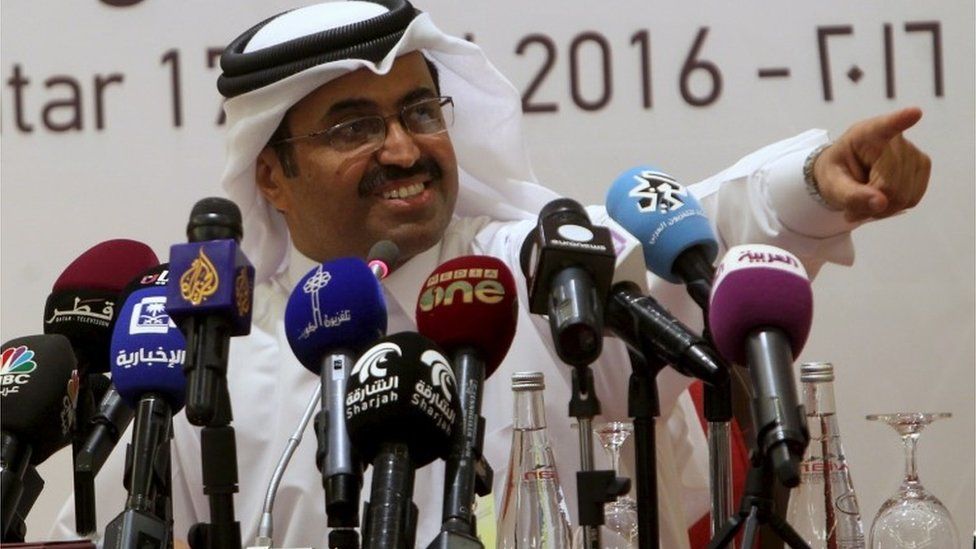Oil meeting aiming to cap output ends without agreement
- Published

A meeting of the world's leading oil exporters to discuss capping production has ended without agreement.
After hours of talks in Qatar, the country's energy minister Mohammed bin Saleh al-Sada said that the oil producers needed "more time".
Most members of the Opec producers' group, plus other oil exporters including Russia, attended the talks.
They wanted a deal that would freeze output and help stem the plunge in crude prices over the past 18 months.
"The general conclusion was that we need more time to consult among ourselves in Opec and non-Opec producers," Mr Sada said.
Oil prices tumbled in Asian trading as a result, with the price of both US and London crude oil down more than 5%.
Talks hit difficulties earlier on Sunday as reports emerged of tensions between Iran and Saudi Arabia. Iran did not attend the meeting.
Saudi Arabia, the world's largest oil exporter, appeared willing to only freeze output if all Opec members agreed, including Iran.
But Iran maintained it would continue the increase in oil production it has followed since economic sanctions were lifted earlier this year.
"As we're not going to sign anything, and as we're not part of the decision to freeze output, we ultimately decided it was not necessary to send a representative," the Iranian government said.
Analysis: Andrew Walker, BBC World Service economics correspondent
The failure to agree a freeze is not going to help oil exporters desperate to see the price of crude oil rise. They are hurting. Even Saudi Arabia - despite having significant financial buffers - is overhauling its public finances and trying to diversify its economy away from oil.
Other major oil producers are finding life even harder. One OPEC member, Angola, has even gone to the International Monetary Fund seeking to negotiate financial assistance.
There is, perhaps, some compensation for the countries at the Doha meeting in that their failure to agree to curtail supply increases is likely to renew the pressure on shale oil producers in the US, who were not and never would be represented at a gathering such as this.
The rise of the American shale industry in the last decade or so is one of the main reasons why global supplies are so plentiful and why prices are now less than half what they were in mid-2014.
Mr Sada told reporters after the meeting: "We of course respect [Iran's] position... The freeze could be more effective definitely if major producers, be it from Opec members like Iran and others, as well as non-Opec members, are included in the freeze."
Russia's oil minister Alexander Novak said Moscow had not closed the door on a global deal to freeze output. However, the Reuters news agency reported, Mr Novak said he was disappointed at the failure to reach a decision as he had travelled to Qatar expecting to sign a deal, not debate one.
'Mother of all meetings'
The failure to agree a deal sent oil prices lower in trading on Asian markets. The uncertainty also hit share markets.
The next scheduled Opec meeting is in June.
Abhishek Deshpande, chief oil analyst at Natixis, described it as "the mother of all Opec meetings" which showed the nervousness among many oil producers.
It was not formally an Opec event, though most of the group's members were represented.
However, Opec has been slow to respond to the sharp fall in oil prices, which are still less than half the peak of $115 ($81) a barrel seen in June 2014.
The price of oil has risen in recent weeks largely due to traders considering the possibility that some major exporters will limit supply.
Brent crude oil, the international benchmark, finished last week at around $43 a barrel, having dipped as low as $27 earlier this year.
Opec members have been working on the deal since Saudi Arabia, Russia, Qatar and Venezuela agreed to freeze production in February if other countries followed suit.
- Published17 April 2016
- Published7 March 2016
- Published22 February 2016
- Published16 February 2016
- Published18 January 2016